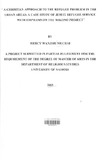| dc.description.abstract | This is a study on the plight of the refugees and how JRS is assisting them especially in the urban areas. The focus is on the JRS as a case study and more so on the Mikono project. The objectives of the study are, analysing the origin of JRS and that of the Mikono project, investigating the work of JRS and of the Mikono project, identifying the social, psychological and economic implications of the Mikono project on the refugees, identifying the theological implications as far as the plight of the refugees is concerned.
The study utilizes three main methods in the collection of primary data. That is, questionnaire method, the questionnaire interview method, and observation both participatory and non-participatory. For the secondary sources of data which forms the bibliography, various libraries were visited which include Jomo Kcnyatta Memorial Library [JKML], Main Campus University of Nairobi, Hekima College library, All Africa
Council of Churches|AACC] library, JRS Resource Centre, among others. These methods
'y
were expected to compliment and supplement each other.
The study is guided by two hypotheses, that is, refugees who earn a living lead a better and more fulfilled lives and that the Mikono project leads to the empowerment of the refugees economically.
The study utilizes the model of church-as-family as a theoretical framework as put forward by Orobator in his book, The Church-As-Family: An African Ecclesiology in its Social
Context. The model is divided into three categories, that is, church for life, church of solidarity and church of service.
The work has five chapters. The first chapter deals with the introduction of the subject of the plight of the refugees. The second chapter deals with the question of JRS, its origin and its work, with an introduction of the Jesuits since this is an important background for JRS. On the work of JRS the study concentrates on its mission of accompaniment, service and advocacy. This chapter also deals with the pastoral care that is offered to the refugees.
The third chapter is concerned with the mikono project which is one of the JRS’ projects that endevours to enable the refugees become self-reliant. This chapter also includes the whole question of integration. Here three main forms of integration are discussed, that is, social integration, economic integration and psychological integration. Various examples are included in this section as devices of better comprehension of the problem of integration.
V
The fourth chapter deals with theological reflection. The study uses the teachings of the bible both OT and NT, the Roman Catholic traditions, that is the teachings of the various popes on the question of the refugees and the teaching of Vatican II more so the Gaudium et spes. This sources point as to why the Christian faith should be concerned with the plight of the refugees. On the question of how the Christians should address themselves to this problem, the model of church-as-family is discussed at length.
\
The fifth chapter is that of conclusion and recommendation. The study concludes that, although religion has been deemed in some quarters as irrelevant, it continues to be relevant especially while dealing with the plight of the refugees. That the plight of the refugees is the concern of each and every person and should not be seen as being the concern of only those people who arc directly involved with the refugees. That there is a need for refugees to become self-reliant so as to be able to lead authentic lives.
That integration in to the host society in all its facets is necessary if the refugees are to become an asset and not a liability to the host society. That the major difference between religious oriented organizations and the secular organizations that assist the refugees is in the quality of services rendered. This is because they assist the refugees in holistic manner catering for both the material and the spiritual needs of the refugees.
The study has five recommendations. That the host governments should legislate laws that are refugee friendly. That the churches should go out of their way to make sure that there exists good relationships between the host community and the refugee^, That the various brands of Christian churches should promote the spirit of ecumenism especially while dealing with the refugees. That the whole idea of advocacy for refugees should be explored further not only in JRS but also amongst other organizations that are concerned with advocacy. That it is necessary to solve the problem of the refugees before it occurs, this means that the organizations that are involved with the refugees and even the various governments should be well aware of the early warnings of an imminent socio-political disintegration and do all that they can to avert the same. Here experts such as peace
negotiators should be called in. This will go along way in reducing the number of the refugees | en_US |

